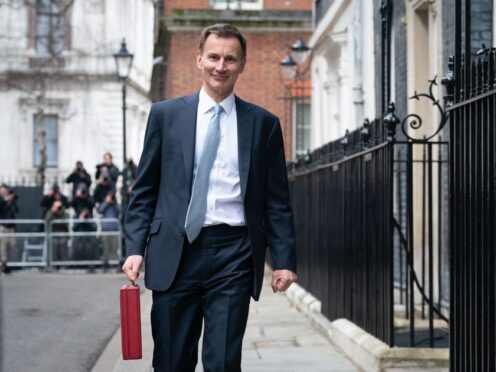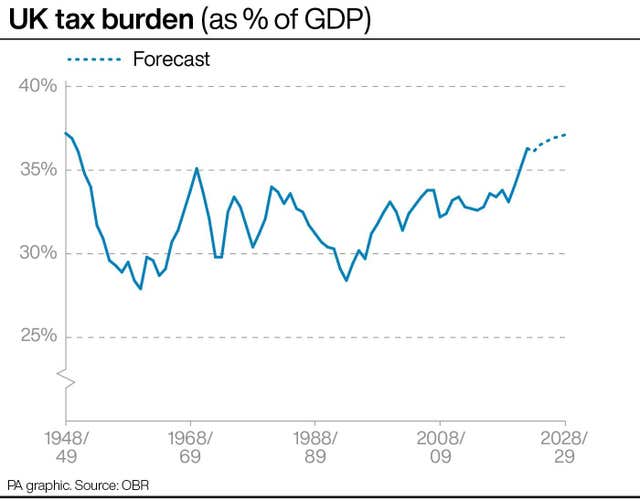
Jeremy Hunt has conceded the newly stated Conservative aim to end national insurance altogether will not happen “any time soon”, despite leaving the door open for more pre-election giveaways.
The Chancellor spent around £10 billion on the 2p cut to national insurance in his spring Budget, although experts have said the UK tax burden is still set to reach a record high.
During broadcast interviews on Thursday, Mr Hunt said he wants to “end the unfairness” of the system but that eliminating contributions altogether would be a “huge thing to do”.
The Tory Government has said its long-term aim is to eliminate what it calls a “double tax on work” in the form of national insurance and income tax – a move branded reckless by its political opponents.
But Mr Hunt told Times Radio on Thursday: “That’s a huge job… I don’t think it’s realistic to say that’s going to happen any time soon.”
Speaking to Sky News, he suggested the Government could potentially “merge” national insurance and income tax.
A number of differences between the two mean it is unclear how such a move would work in practice. For example, pensioners pay income tax but not national insurance contributions (NICs).
It could also potentially see income tax increase as a way of making up the shortfall from abolishing NICs.
According to the independent Office for Budget Responsibility, income tax raised around £251 billion in 2022-23, while national insurance brought in around £177 billion.
Shadow chancellor Rachel Reeves said talk of abolishing NICs altogether was “irresponsible” and drew parallels with the £45 billion tax-cutting mini-budget announced by former PM Liz Truss, which unleashed economic chaos.
Ms Reeves told ITV’s Good Morning Britain: “You get rid of national insurance altogether, that’s a cost of £46 billion every single year. And I think it is really irresponsible to start making promises without the faintest idea of where the money’s going to come from.”
Downing Street later insisted the move will only happen “when it is responsible and can be achieved without increasing borrowing”.
Asked how it would be funded, the Prime Minister’s official spokesman said: “I’m not going to speculate any further the sort of timetable and exactly how we would do that, but obviously the Government has been very clear that it is focused on reducing taxes for working families as it has now consistently delivered over the last two fiscal events.”
It comes as expert Budget analysis overnight suggested this Parliament is the first in modern history to see a drop in living standards, with real household disposable income set to fall by 0.9%.
Asked about fiscal drag, whereby people are pulled into higher tax bands while thresholds are frozen, Mr Hunt said he is “not pretending” to have “brought all those taxes down”.
He said the revenue raised is needed to pay for measures like the furlough scheme during the pandemic and support for households facing spiralling energy bills amid the cost-of-living crisis.
“I’m not pretending that I brought all those taxes down in one go. We can’t afford to do that. It wouldn’t be responsible to do that. But do I want to carry on bringing them down, as I did yesterday, as I did in the autumn statement? Yes, I do,” Mr Hunt told Times Radio.

Asked whether he is planning another fiscal event before the election, Mr Hunt said: “No, but if there’s an autumn election, which is the working assumption, then theoretically it would be possible to have one.”
The prospect of another statement before Prime Minister Rishi Sunak goes to the country may give hope to those Tory backbenchers who wish the Chancellor had gone further in the Budget.
They include former home secretary Suella Braverman, who told the Commons she would have preferred to see an income tax cut that would help pensioners as well as workers.
But Mr Hunt has little room for manoeuvre. The Office for Budget Responsibility (OBR) said Wednesday’s announcements left less than £9 billion of headroom against his debt target, much of which would be wiped out if the freeze on fuel duty is extended as it has been every year since 2010.

His plans also rely on tight spending restrictions after the election, which commentators have suggested involve cuts that departments will struggle to implement.
Independent think tanks have said the Budget leaves the “big picture” largely unchanged, with overall taxation rising as a result of fiscal drag.
In analysis published overnight, the Resolution Foundation said the Budget showed this Parliament – between 2019 and 2025 – is the first in modern history to see a fall in living standards, with real household disposable income set to drop by 0.9%.
IFS director Paul Johnson said the Chancellor had used “smoke and mirrors”, while Torsten Bell, of the Resolution Foundation, said Wednesday’s tax cuts relied on “the prospect of a sour £19 billion of post-election tax rises, and the fiscal fiction that another £19 billion of cuts to public services can be delivered”.

Neither the Conservatives nor Labour have been keen to address the implications of current post-election spending plans, although a Labour spokesman acknowledged the party will be passed a difficult inheritance if it wins the election.
The Opposition has said it will look at the Government’s plans and “adapt” its own proposals after the Chancellor’s decision to adopt Labour’s long-held policy of scrapping the non-dom status for wealthy foreigners.
On Thursday, the party is to focus on the overall picture of tax, saying the Budget means the average family will be £870 worse off by 2028/29, largely due to tax thresholds being frozen.
Labour said the Chancellor’s plans will only pay back £5 for every extra £10 people pay in tax, while another 3.7 million people face being dragged into paying income tax thanks to the threshold freeze.
Among other key measures announced was the scrapping of the non-dom tax status enjoyed by wealthy foreigners, which has been a long-held Labour pledge.
Sir Keir Starmer said it was “humiliating” for the Government to have stolen the Opposition’s tax policy, which it had said it would use to help fund the NHS and free breakfast clubs.
Speaking during a visit to a construction site in the City of London on Thursday, Sir Keir said: “We’ve argued for years that they should get rid of the non-dom tax status, they’ve resisted that. Now, completely out of ideas, the only decent policy they’ve got is the one that they’ve lifted from us.
“Obviously we will keep our commitment to the NHS, so important it is. We’ll go through all of the numbers and we’ll be absolutely clear nothing in our manifesto will be unfunded and uncosted. That is an iron rule for the Labour Party.”
Sir Keir said the “overall story of the Budget was, as ever, Government give with one hand and take much more with the other”.

Enjoy the convenience of having The Sunday Post delivered as a digital ePaper straight to your smartphone, tablet or computer.
Subscribe for only £5.49 a month and enjoy all the benefits of the printed paper as a digital replica.
Subscribe